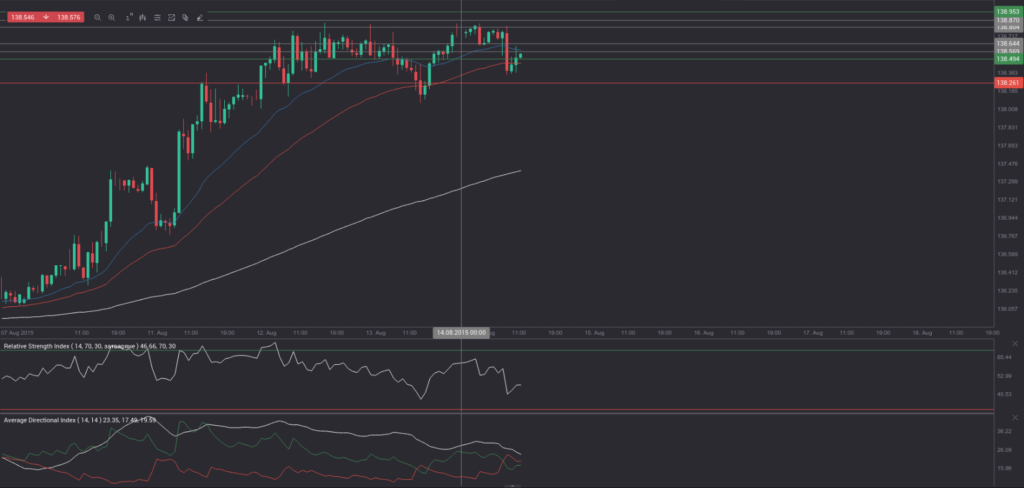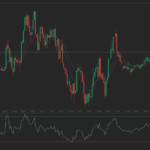Yesterday’s trade saw EUR/JPY within the range of 138.04-138.88. The pair closed at 138.72, rising 0.11% on a daily basis and marking the fourth consecutive trading day of gains. The daily gain rate, however, has been the smallest one since August 6th, when the cross added a mere 0.04%. The daily high matched the high from Wednesday, while it has been the highest level since June 25th, when the pair registered a high of 138.92.
At 9:46 GMT today EUR/JPY was down 0.11% for the day to trade at 138.61. The pair touched a daily low at 138.35 at 7:55 GMT.
Correlation with Major currency pairs
Taking into account the week ended on August 9th and the daily closing levels of the currency pairs involved, we come to the following conclusions in regard to the strength of relationship:
EUR/JPY to EUR/USD (0.5550, or strong)
EUR/JPY to USD/CHF (0.4410, or moderate)
EUR/JPY to USD/JPY (0.4057, or moderate)
EUR/JPY to NZD/USD (0.2518, or weak)
EUR/JPY to AUD/USD (0.1432, or weak)
EUR/JPY to GBP/USD (-0.3789, or moderate)
EUR/JPY to USD/CAD (-0.6764, or strong)
1. During the examined period EUR/JPY moved strongly in one and the same direction with EUR/USD, while moving strongly in the opposite direction compared to USD/CAD.
2. EUR/JPY moved to a moderate extent in one and the same direction with USD/CHF and USD/JPY, while moving to a moderate extent in the opposite direction compared to GBP/USD during the past week.
3. The relationship between EUR/JPY and NZD/USD, as well as EUR/JPY and AUD/USD was insignificant during the period in question.
Bond Yield Spread
The yield on Japanese 2-year government bonds went as high as 0.009% on August 13th, or the highest level since August 11th (0.013%), after which it slid to 0.005% at the close to lose 0.001 percentage point on a daily basis, while marking a third consecutive day of decrease.
The yield on German 2-year government bonds went as high as -0.267% on August 13th, or the highest level since August 11th (-0.265%), after which it slid to -0.276% at the close to gain 0.003 percentage point on a daily basis. It has been the first gain in the past six trading days.
The spread between 2-year Japanese and 2-year German bond yields, which reflects the flow of funds in a short term, shrank to 0.281% on August 13th from 0.285% during the prior day. The August 13th difference has been the lowest one since August 10th, when the yield spread was 0.280%.
Meanwhile, the yield on Japan’s 10-year government bonds soared as high as 0.388% on August 13th, or the highest level since August 11th (0.420%), after which it slid to 0.361% at the close to lose 0.005 percentage point compared to August 12th, while marking a fifth straight day of decrease.
The yield on German 10-year government bonds soared as high as 0.661% on August 13th, or the highest level since August 11th (0.679%), after which it slid to 0.637% at the close to appreciate 3.2 basis points (0.032 percentage point) compared to August 12th. It has been the first gain in the past three trading days.
The spread between 10-year German and 10-year Japanese bond yields expanded to 0.276% on August 13th from 0.239% during the prior day. The August 13th yield difference has been the largest one since August 10th, when the spread was 0.290%.
Daily and Weekly Pivot Levels
By employing the Camarilla calculation method, the daily pivot levels for EUR/JPY are presented as follows:
R1 – 138.80
R2 – 138.87
R3 (range resistance – green on the 1-hour chart) – 138.95
R4 (range breakout – red on the 1-hour chart) – 139.18
S1 – 138.64
S2 – 138.57
S3 (range support – green on the 1-hour chart) – 138.49
S4 (range breakout – red on the 1-hour chart) – 138.26
By using the traditional method of calculation, the weekly pivot levels for EUR/JPY are presented as follows:
Central Pivot Point – 136.00
R1 – 137.06
R2 – 137.86
R3 – 138.92
S1 – 135.20
S2 – 134.14
S3 – 133.34






